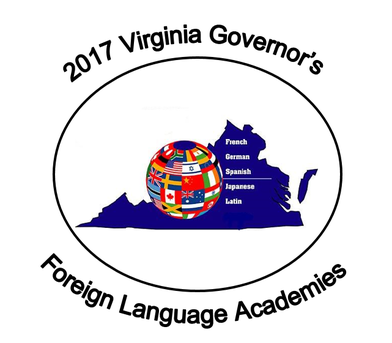About the Virginia Governor's World Language Academies

The Governor’s World Language Academies originated in 1986 with a charge from a member of the Virginia Board of Education to prepare a proposal for a “demonstration and exemplary project” in foreign language education. The result of that proposal was the first Governor’s French Academy executed with funding for the first year provided by federal grants. After the first year, the state funded the operating costs, which were included in the general budget for the Virginia Department of Education. Over the next two years, Governor’s Foreign Language Academies were added in Asian Studies, German, Latin, Russian Studies, and Spanish. Presently there are Foreign Language Academies in French, German, Japanese, Latin, and Spanish. The state and local school divisions now share in the costs.
The Latin and Japanese Academies, hosted at Randolph-Macon College, are partial-immersion, culture and language studies programs. Students for the Academies are nominated by their school divisions and are selected based on the strength of their applications in a competitive statewide process. Schools are limited in the number of students they may nominate for each language program, ensuring that the student participants are highly motivated learners and among the top performing students from their schools.
Historically, the Governor’s Foreign Language Academy teaching staff has been made up of public and private school teachers as well as language experts and instructions from post-secondary institutions. College-age resident advisors (RA) assist with afternoon and evening activities and enforce dormitory rules. The RAs are generally college students who are native or heritage speakers or are majoring in the language of the Academy. Many are former Academy students themselves. The student-staff ratio is approximately 5:1.
Because of the unique opportunity to teach and interact with some of the brightest and most motivated language students in the Commonwealth, faculty and staff members often return for multiple summers. In order to maximize the benefits of the program, Monday through Saturday is filled with various activities beginning with breakfast; classes; lectures, field trips, projects and recreation time in the afternoons; and dinner and evening activities that do not end until shortly before lights out. Sunday mornings are unencumbered to allow students to attend nearby religious services, but Sunday afternoons and evenings are packed with activities as well. The culminating experience is the sharing of projects or works in progress by each Academy during the closing ceremonies. Neither grades nor credit are given for the completion of coursework, but students receive Certificates of Commendation at the close of the program. The number of students who apply for the program each year serves as a strong indication of the program’s success and popularity.
The Latin and Japanese Academies, hosted at Randolph-Macon College, are partial-immersion, culture and language studies programs. Students for the Academies are nominated by their school divisions and are selected based on the strength of their applications in a competitive statewide process. Schools are limited in the number of students they may nominate for each language program, ensuring that the student participants are highly motivated learners and among the top performing students from their schools.
Historically, the Governor’s Foreign Language Academy teaching staff has been made up of public and private school teachers as well as language experts and instructions from post-secondary institutions. College-age resident advisors (RA) assist with afternoon and evening activities and enforce dormitory rules. The RAs are generally college students who are native or heritage speakers or are majoring in the language of the Academy. Many are former Academy students themselves. The student-staff ratio is approximately 5:1.
Because of the unique opportunity to teach and interact with some of the brightest and most motivated language students in the Commonwealth, faculty and staff members often return for multiple summers. In order to maximize the benefits of the program, Monday through Saturday is filled with various activities beginning with breakfast; classes; lectures, field trips, projects and recreation time in the afternoons; and dinner and evening activities that do not end until shortly before lights out. Sunday mornings are unencumbered to allow students to attend nearby religious services, but Sunday afternoons and evenings are packed with activities as well. The culminating experience is the sharing of projects or works in progress by each Academy during the closing ceremonies. Neither grades nor credit are given for the completion of coursework, but students receive Certificates of Commendation at the close of the program. The number of students who apply for the program each year serves as a strong indication of the program’s success and popularity.
